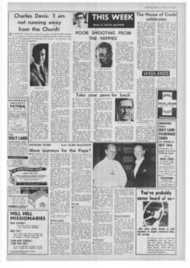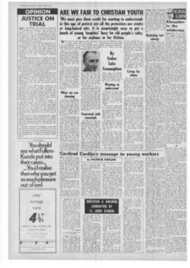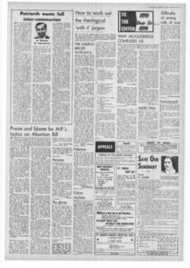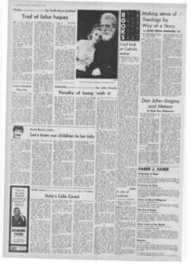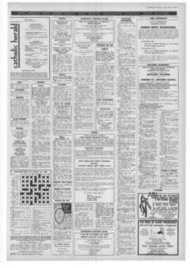Page 2, 28th July 1967
Page 2

Report an error
Noticed an error on this page?If you've noticed an error in this article please click here to report it.
Tags
Share
Related articles
The Heythrop Talks To Be Published
Unpredictable Aspects Of The Ecumenical Field
Christians Should Unite To Help Coloured People
Inter-church Role For
Hopes Of New Inter-faith Talks Here
ECUMENICAL STEP FORWARD AT HEYTHROP CONFERENCE
BY A STAFF REPORTER
ATHOLICS will be praying more often with their separated brethren and hearing more non-Catholic clergy speaking in their churches as a result of last week's Ecumenical Conference at Heythrop College, Oxfordshire.
The details have yet to be spelled out, but it seems the ecumenical climate is now ready for full-scale participation by English and Welsh Catholics.
The pace and the direction will be mapped out in October by the newly constituted Ecumenical Commission under the presidency of Bishop Holland of Salford, Bishop Langton Fox of Menevia and Auxiliary Bishop Burke of Salford.
This commission, which will include religious and lay representatives from the 19 dioceses, H.M. Forces and the Ukrainian Exarchate, will table the "ecumenical directives" for ratification by the Episcopal Conference in December.
As the bishops originally set up the commission it seems almost certain they will approve any recommendation made by it.
FEARS DISPELLED Last week's conference went a long way towards dispelling fears other communions have about Catholics wanting church unity on Catholic terms.
Fr. Bernard Leeming, S.J., Newman Professor of Ecumenical Theology at Heythrop, told the conference that the first requirement of ecumenism was the "reform and renewal of the Roman Catholic Church. as the Decree on Ecumenism repeatedly says; and through brotherly contact with others, that reform and renewal can be helped forward."
This did not mean that Catholics surrendered their beliefs, he said, or that involvement was a means of persuading others. "What it does mean is that we all can learn from others and together we can understand the purpose of God in Christ and what that requires in the present conditions of the world."
Explaining his views, Fr. Leeming said Anglicans believegl that episcopal ordination was needed for a united Church, but their involvement was not to persuade others to accept episcopal ordination.
"The aim of the ecumenical movement is initially to reduce the scandal of Christian disunity by mutual friendship, respect and co-operation in works of justice and charity."
Bishop Holland. who welcomed five non Catholic speakers to the conference, stressed that the Catholicism of today was a very different one from that of only five years ago. "No one knows exactly where the ecumenical movement will eventually lead, but it must be left to the Holy Spirit to enlighten us all."
Canon Purdy, of the Secretariat for Christian Unity in Rome, explaining the new Vatican Directory on Ecumenism, said that the message it gave was "too conservative for some countries and too radical for others." Although he wasn't explicit he appeared to be saying England fell into the latter category.
At the conference the "progressive" wing—call them the Ecumaniacs if you like— thought parts of the Directory did not allow sufficient freedom for ecumenical contact.
However, it was generally agreed that where possible the Vatican Directory "should be interpreted as liberally as possible."
PULPIT EXCHANGES The difficulty of "interpretation" has already caused some scandal, embarrassment and friction. Non-Catholic pastors who have invited priests to speak from their pulpits have been distressed not to receive a reciprocal invitation and vice versa.
Bishop Holland said he was still wary about "pulpit exchanging" because it came into the realm of liturgy. He would prefer clergy exchanges to take place at non-Eucharistic services.
After the Ecumenical Commission starts to operate it is hoped that the pace of ecumenism will he much the same up and down the country. However, because of the special nature of religion in Wales, there will be a special subcommission to handle its progress.
Rhodesia protest
SOME 800 Rhodesian Catholics have signed a petition protesting against a Government plan to enforce racial segregation of residential areas. This followed a condemnation by the Catholic bishops of Rhodesia of proposed laws to force the eviction of Asians and Africans from predominantly White areas.
blog comments powered by Disqus




